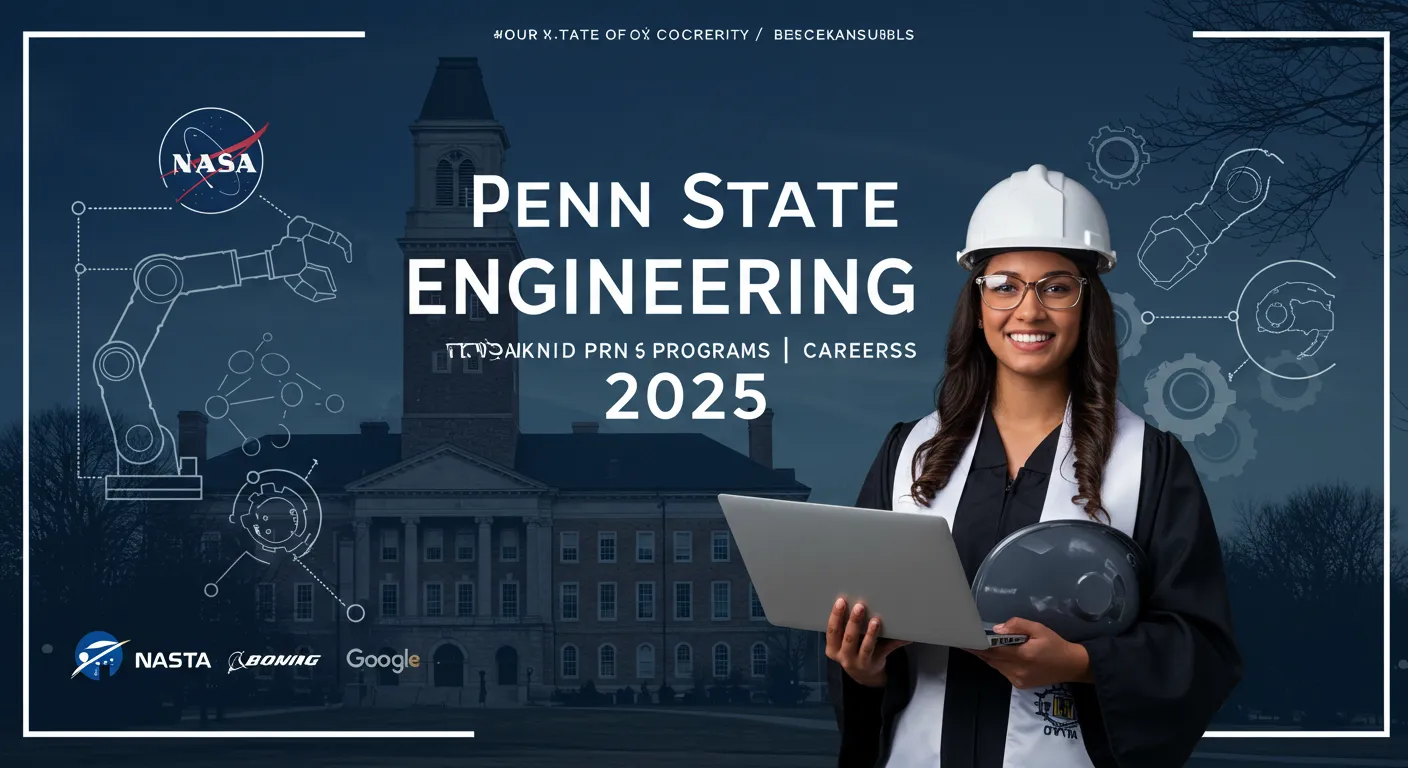When it comes to pursuing a top-notch engineering education in the United States, Penn State University consistently ranks among the best. Known for its robust research output, state-of-the-art facilities, and powerful alumni network, Penn State’s College of Engineering offers students a comprehensive, real-world-focused education that prepares them for global careers.
If you’re considering Penn State University for engineering, this guide will give you a complete breakdown — from academic strengths to career outcomes, tuition fees, rankings, and FAQs.

Why Choose Penn State University for Engineering?
Penn State’s College of Engineering, located at the University Park campus in Pennsylvania, is one of the largest and most prestigious public engineering schools in the United States. Here are a few reasons why students choose Penn State University for engineering:
-
Top national rankings across multiple engineering disciplines
-
Over 13,000 engineering students from across the globe
-
Research partnerships with NASA, Google, Boeing, and the U.S. Department of Defense
-
A 93% placement rate for engineering graduates
-
Access to over 70 engineering-related student organizations
National and Global Rankings (2025)
Penn State consistently earns high marks for its engineering programs. Here are the 2025 rankings for key areas:
| Program | U.S. News Rank (Undergraduate) | U.S. News Rank (Graduate) |
|---|---|---|
| Overall Engineering | #21 | #26 |
| Mechanical Engineering | #16 | #14 |
| Aerospace Engineering | #15 | #12 |
| Civil Engineering | #17 | #18 |
| Electrical Engineering | #18 | #16 |
| Industrial Engineering | #8 | #9 |
| Materials Science | #10 | #8 |
| Nuclear Engineering | #4 | #3 |
✅ Highlight: Penn State’s nuclear, industrial, and materials engineering programs are among the top 10 in the nation.
Undergraduate Engineering Programs at Penn State
Students pursuing a Bachelor of Science in engineering at Penn State can choose from a wide range of majors:
-
Mechanical Engineering
-
Electrical Engineering
-
Civil and Environmental Engineering
-
Computer Engineering
-
Aerospace Engineering
-
Chemical Engineering
-
Biomedical Engineering
-
Industrial and Manufacturing Engineering
-
Nuclear Engineering
-
Materials Science and Engineering
🧠 All undergraduate engineering programs are ABET-accredited.
Graduate Engineering Degrees
Penn State offers over 50 graduate engineering programs, including:
-
Master of Science (MS) and Master of Engineering (M.Eng.) degrees
-
Ph.D. programs in core disciplines and interdisciplinary areas
-
Online graduate engineering degrees through Penn State World Campus
Popular graduate specializations include:
-
Data Analytics and Machine Learning
-
Artificial Intelligence
-
Additive Manufacturing (3D Printing)
-
Energy Systems Engineering
-
Environmental Engineering
Research and Innovation
Penn State is a Tier 1 research university with over $1 billion in annual research expenditures. Its engineering research centers include:
-
Applied Research Laboratory (ARL) – Partnering with the U.S. Navy
-
Center for Innovative Materials Processing
-
Institute for Natural Gas Research
-
Battery and Energy Storage Technology (BEST) Center
-
Autonomous and Intelligent Systems Research Lab
🔬 Penn State ranks among the top 10 U.S. universities for industry-sponsored research.
Internships, Co-Ops, and Career Opportunities
Studying engineering at Penn State opens doors to world-class career opportunities. The university partners with 600+ companies for co-op and internship programs. Some top recruiters include:
-
Lockheed Martin
-
General Motors
-
Intel
-
Boeing
-
IBM
-
ExxonMobil
-
Google
-
NASA
Penn State’s Engineering Career Resources & Employer Relations Office helps students connect with employers through job fairs, interview coaching, and networking events.
Tuition and Financial Aid
| Category | In-State Students | Out-of-State Students |
|---|---|---|
| Tuition (per year) | ~$19,800 | ~$39,500 |
| Fees & Supplies | ~$2,000 | ~$2,000 |
| Room and Board | ~$12,500 | ~$12,500 |
| Total (estimated/year) | ~$34,300 | ~$54,000 |
Penn State offers financial aid, merit-based scholarships, and need-based grants. Engineering students may also receive funding through:
-
Schreyer Honors College Scholarships
-
Department-specific awards
-
Research assistantships (for graduate students)
Campus Life for Engineering Students
Penn State’s University Park campus is a vibrant community with a strong engineering culture. Key highlights:
-
Engineering Design Studios and labs available 24/7
-
Makerspaces with 3D printers, laser cutters, and robotics tools
-
Over 70 engineering-specific clubs and organizations
-
Annual events like HackPSU, WE ARE for Engineers Week, and Eco-Marathon
-
Access to intramural sports, art museums, and Big Ten athletics
Alumni Network and Career Outcomes
With over 760,000 Penn State alumni worldwide, students benefit from one of the largest and most loyal alumni networks in the U.S. Engineering graduates have gone on to lead companies like:
-
Boeing
-
General Electric
-
Google
-
Raytheon Technologies
-
Tesla
Average starting salary for engineering grads: $72,000 – $85,000 (based on discipline and role)
FAQs: Penn State University for Engineering
1. Is Penn State good for engineering?
Yes, Penn State is nationally ranked across almost every engineering discipline and is highly respected by employers, especially in the energy, manufacturing, and aerospace sectors.
2. What is the acceptance rate for engineering at Penn State?
The general acceptance rate for Penn State is around 54%, but highly competitive programs like Mechanical or Computer Engineering may be more selective.
3. Does Penn State offer online engineering degrees?
Yes, through Penn State World Campus, students can earn master’s degrees in fields like Software Engineering, Systems Engineering, and Engineering Management online.
4. Which engineering major is the most popular at Penn State?
Mechanical, Electrical, and Computer Engineering are among the most enrolled and in-demand programs.
5. Does Penn State offer co-op and internship opportunities?
Yes, Penn State has an extensive co-op and internship network, with many students gaining hands-on experience in Fortune 500 companies.
6. How diverse is the engineering school?
Penn State actively supports diversity in STEM through programs like Women in Engineering, Multicultural Engineering Program (MEP), and various affinity groups.
Final Thoughts
Choosing Penn State University for engineering means investing in a world-class education that combines theory, practice, and innovation. With nationally ranked programs, advanced research, and powerful career placement, Penn State is a strong choice for aspiring engineers.



